Book contents
- Frontmatter
- 1 THE JALAYIRIDS, MUZAFFARIDS AND SARBADĀRS
- 2 TĪMŪR IN IRAN
- 3 THE SUCCESSORS OF TĪMŪR
- 4 THE TÜRKMEN DYNASTIES
- 5 THE SAFAVID PERIOD
- 6 THE SAFAVID ADMINISTRATIVE SYSTEM
- 7 EUROPEAN CONTACTS WITH PERSIA, 1350–1736
- 8 TRADE FROM THE MID-14TH CENTURY TO THE END OF THE SAFAVID PERIOD
- 9 SOCIAL AND INTERNAL ECONOMIC AFFAIRS
- 10 THE EXACT SCIENCES IN TIMURID IRAN
- 11 PERSIAN SCIENCE IN SAFAVID TIMES
- 12 RELIGION IN THE TIMURID AND SAFAVID PERIODS
- 13 SPIRITUAL MOVEMENTS, PHILOSOPHY AND THEOLOGY IN THE SAFAVID PERIOD
- 14 CARPETS AND TEXTILES
- 15 (a) TIMURID ARCHITECTURE
- (b) SAFAVID ARCHITECTURE
- 16 (a) THE PICTORIAL ARTS IN THE TIMURID PERIOD
- (b) THE ARTS IN THE SAFAVID PERIOD
- 17 (a) PERSIAN LITERATURE IN THE TIMURID AND TÜRKMEN PERIODS (782–907/1380–1501)
- (b) HĀFIZ AND HIS CONTEMPORARIES
- (c) PERSIAN LITERATURE IN THE SAFAVID PERIOD
- 18 PERSIAN POETRY IN THE TIMURID AND SAFAVID PERIODS
- Bibliographies
- Plate section
- Plate section
- Plate section
- Maps
- References
17 (a) - PERSIAN LITERATURE IN THE TIMURID AND TÜRKMEN PERIODS (782–907/1380–1501)
Published online by Cambridge University Press: 28 March 2008
- Frontmatter
- 1 THE JALAYIRIDS, MUZAFFARIDS AND SARBADĀRS
- 2 TĪMŪR IN IRAN
- 3 THE SUCCESSORS OF TĪMŪR
- 4 THE TÜRKMEN DYNASTIES
- 5 THE SAFAVID PERIOD
- 6 THE SAFAVID ADMINISTRATIVE SYSTEM
- 7 EUROPEAN CONTACTS WITH PERSIA, 1350–1736
- 8 TRADE FROM THE MID-14TH CENTURY TO THE END OF THE SAFAVID PERIOD
- 9 SOCIAL AND INTERNAL ECONOMIC AFFAIRS
- 10 THE EXACT SCIENCES IN TIMURID IRAN
- 11 PERSIAN SCIENCE IN SAFAVID TIMES
- 12 RELIGION IN THE TIMURID AND SAFAVID PERIODS
- 13 SPIRITUAL MOVEMENTS, PHILOSOPHY AND THEOLOGY IN THE SAFAVID PERIOD
- 14 CARPETS AND TEXTILES
- 15 (a) TIMURID ARCHITECTURE
- (b) SAFAVID ARCHITECTURE
- 16 (a) THE PICTORIAL ARTS IN THE TIMURID PERIOD
- (b) THE ARTS IN THE SAFAVID PERIOD
- 17 (a) PERSIAN LITERATURE IN THE TIMURID AND TÜRKMEN PERIODS (782–907/1380–1501)
- (b) HĀFIZ AND HIS CONTEMPORARIES
- (c) PERSIAN LITERATURE IN THE SAFAVID PERIOD
- 18 PERSIAN POETRY IN THE TIMURID AND SAFAVID PERIODS
- Bibliographies
- Plate section
- Plate section
- Plate section
- Maps
- References
Summary
This long period of 120 years was a troubled one. Tīmūr's attack on Iran, which began in 782/1380–1 with the invasion of Khurāsān and Sīstān, terminated the pre-Timurid interregnum in a period characterised by sudden alarms. Even after the conqueror Tīmūr's death, except for the comparatively peaceful reign of Shāh Rukh (807–850/1405–1447), conditions throughout the land remained unsettled; his successors could not be at peace one with another; government was the plaything of turbulent rivals. Besides numerous princes of the Timurid dynasty, there were other leaders on the scene, such as those of two Türkmen dynasties, the Qarā Quyūnlū and Āq Quyūnlū, who had established themselves in the regions of Āzarbāījān and western Persia, with occasional inroads into the eastern regions of the country. Eventually this state of affairs was ended in the east by the Shaibanids and in the west by the Safavids.
Disturbances that can be dated back to the Mongol invasions, and which finally developed into the disruption and disorder of the period after Shāh Rukh's death, occasioned a serious decline in civilisation and deterioration in thought. At the beginning of this period a few of the scholars, poets and writers of the interval between the Mongol Īl-Khāns and the Timurids were still alive and affording contributions to science and literature. But apart from these few, and with the possible exception of those who had gathered at the court of Sultān Husain Bāīqarī at Heart and who were didactic rather than original, we hardly hear of any important or justly celebrated men of learning or science until the latter part of the 9th/15th century.
- Type
- Chapter
- Information
- The Cambridge History of Iran , pp. 913 - 928Publisher: Cambridge University PressPrint publication year: 1986
References
- 1
- Cited by

